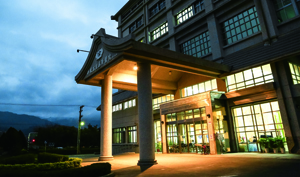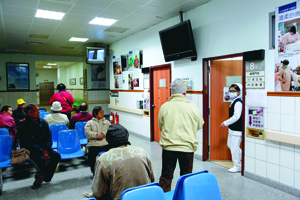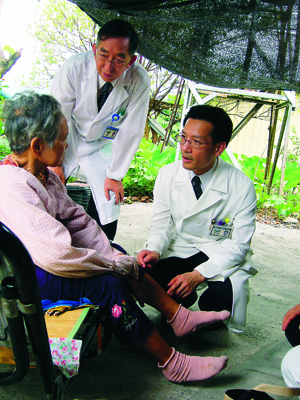

| The Lights Are Always On | ||||||||||
| By Wu Wan-lin Translated by Tang Yau-yang Photos by Yang Shun-bin | ||||||||||
Yuli Tzu Chi Hospital in eastern Taiwan has safeguarded the health of local residents and travelers since its opening in 1999. Located in a remote area, the hospital has been operating in the red and is short on staff. Even so, the personnel hold to their original aspirations to protect lives and do their best to provide services tailored to the needs of their patients.
The alarm clock went off at 4:30 a.m., as it had done for years. A cold front was moving in this morning, and Dr. Chang Yuh-lin (張玉麟), superintendent of Yuli Tzu Chi Hospital, really wanted to hit the snooze button for a few more minutes of sleep. But he didn’t yield to the temptation. Bracing for the cold, he got up and rushed to the emergency room, the first stop of his work day at the hospital. Chang has been the superintendent of the hospital since 2003. It was that year that the hospital moved onto its new campus from the old building which it had used since its inception four years earlier, in 1999. From the beginning, the hospital had had difficulty recruiting staff because the town of Yuli was located on the undeveloped eastern side of the island, far from western Taiwan where the majority of the population lived. Though the new campus was bigger than the old one, the hospital remained as severely understaffed as before. The emergency room had no security guards and just one nurse. The new superintendent, concerned about the safety of his staff, didn’t leave work until after 10:30 at night, and he always returned the next morning before five. He wanted his staff to know that he would be there for them. In the decade since then, he has kept the habit of getting up at 4:30.
Early-bird clinic Yuli produces more rice than any other town in Taiwan. After Dr. Chang started serving at the hospital, he noticed that local rice farmers were often so busy in their fields that they tended to put off doctor appointments in order to take care of their crops. In particular, they were not likely to take time out from bringing in a harvest to see a doctor. The doctors could wait a few days, but the weather or the crops would not. Rain might ruin a harvest, so farmers would finish their harvests before they would do anything else, no matter what. In 2003, to accommodate the schedules of these farmers, the hospital inaugurated its early-bird clinic, which ran from six to eight in the morning, Mondays through Fridays. That way, early-rising farmers could come in for medical attention and still get home in time to carry out their day’s work. Yuli Hospital was the first in Taiwan to offer an early-morning clinic. Out of consideration for his colleagues, Chang ran the early clinic by himself. Later, Dr. Zhang Feng-gang (張鳳岡), a morning swimmer, volunteered to take two days a week from him. That arrangement held until Zhang retired in 2010. Superintendent Chang again became the sole doctor for the early clinic, which was scaled back to four days a week. In the beginning, Chang expected to get some slack time on mornings that were particularly cold and wet. But whenever he arrived at the clinic, there were always people there waiting for him. Seeing that his patients come to him rain or shine, he has not dared slack off a bit over the years. A 95-year-old woman is a big fan of his and a frequent patron of the early-bird clinic. She lives in Ruisui, 30 minutes to the north. To accompany her to the hospital, her family has to get up early too. Out of consideration for them, Chang offered to write her a 30-day prescription with two refills so that she could cut down on her hospital visits. Her family, however, declined his offer. “This is her happiest day. Every month on this day, she is in high spirits and she gets all dressed up to go see the doctor.” The experience helped Chang realize that for some patients, “see the doctor” extends beyond the need to have an illness treated—it also carries a spiritual and therapeutic significance. This realization has helped shape the way that he works with his patients. The early-bird clinic has met a need of the townsfolk. The average age of the patients is about 65. In its first decade, the clinic has served nearly 20,000 patient visits.
Learn to listen to patients Chang is a neurosurgeon. His work does not follow a set schedule because he may be called to operate on patients at any time. For convenience, his patient examination table often serves as his bed for the night. Because he gets so tired, it usually takes him no time at all to fall asleep—before he can even count to three. However, it is not unusual that no sooner has he drifted off to dreamland than he is woken up by a call to attend to a patient or to answer someone’s questions. Despite the disruptions, he is totally dedicated to his work and has no complaints at all.
Over the years, he has learned the vernacular of the local folks. It is important that medical care personnel talk in a language that patients understand, and it is equally vital that they understand what patients tell them. One time an elderly patient told Chang, “My heart is heavy.” The doctor immediately knew that the patient might be suffering from chest pain. Another time someone said, “My ears sing.” Chang did not take the comment lightly, as ringing in the ears might be a precursor of a stroke. “My ears are far away,” another person said, by which he meant that he was having difficulty hearing. In addition to treating patients who come to the hospital, Chang and his colleagues often make house calls. Such calls have won him the trust of some patients who used to distrust medicine or who simply refused to receive treatment. A-zhi, a man over 90 who lived alone, was one example. His hand once became badly swollen. Instead of seeking treatment from a doctor, he applied some herbal concoction on his hand, an act that almost led to cellulitis. Chang went to the old man’s home and, using “a language that the old man could understand,” convinced him to accept treatment. A-zhi also had a heart condition that necessitated regular medical appointments, a requirement he only half-heartedly carried out. He often skipped appointments. Only after Chang had won his trust did he begin to visit the doctor regularly. Later, heart failure reduced his heart to only 15 percent of its normal capacity, making him wheeze heavily. He was admitted to Chang’s hospital, but he refused to eat anything. His son begged and begged, to no avail. When hospital workers talked to the old man, he simply shut his eyes and ignored their pleas. A-zhi’s heart was too weak for him to take in water or receive IV injections. The best resolution for the situation was to convince the old man to eat. Nobody wanted to have to force-feed him, whether through nasogastric intubation or other methods. That would be the last thing that A-zhi wanted too. Stubborn refusal was a hard thing to handle, so Chang was stumped. Early one morning he went to A-zhi’s room to take a look at him. He was still sleeping, and Chang saw a towel at the head of his bed. Just then, Chang recalled what the old man’s son once told him, that A-zhi enjoyed applying a hot towel to his face. Chang quietly picked up the towel, heated it, and gently laid it on the old man’s face for a while before washing his face. Chang then said to him, “It’s time to get up and have something to eat.” The old man opened his eyes, looked at Chang with a nod, and began to eat. That was the break that Chang had been looking for. After that, A-zhi was able to undergo all his treatment and was subsequently discharged from the hospital.
A money burner Yuli is located approximately in the middle of Taiwan’s East Rift Valley, which extends for about 180 kilometers (112 miles)—roughly from Hualien City in the north to Taidong City in the south. The town’s central location in the valley makes Yuli Tzu Chi Hospital particularly important in this long, narrow, mountainous stretch, where medical facilities capable of treating urgent medical cases are sparse. The hospital has about 50 beds. “According to regulations, a hospital with fewer than a hundred beds is not required to offer an emergency room,” Chang explained. “But without one, our mission of safeguarding life becomes very hard to accomplish. Therefore, we insisted on providing emergency service, knowing full well that it would be a heavy burden on our staff and our finances.” Yuli has about 20,000 inhabitants; adding neighboring villages and towns gives the area just less than 60,000 people. With such a small population, it is extremely hard to keep a hospital in the black. “We lose between three to five million NT dollars [US$100,000 to 167,000] a month,” Chang said. “If we also factor in personnel and equipment costs, we spend two dollars for every dollar we take in.” If the hospital is losing money, why do they keep it open? Chang’s answer is sure and firm: “Respect for life.” Open 24 hours a day, the emergency room fulfills an important function in the area. Chang and his colleagues provide much needed medical service to people in the backcountry, where such services would otherwise be very hard to come by. That’s why they, with the support of the Tzu Chi Foundation, keep the lights on and the services running. Critically ill patients often have to be treated immediately to have any reasonable chance of quality survival. They do not have time to travel to better equipped hospitals far away. In Chang’s specialty, time is an especially essential element. A few years ago a family came to Ruisui, about 20 kilometers (12 miles) from Yuli, for sightseeing. A little girl in the family fell from a raised platform and was rushed to the hospital. She was diagnosed with a cerebral hemorrhage. Chang explained the situation to the parents and told them about the need for immediate surgery. With doubt written all over his face, the father asked, “Can your hospital do that?” He apparently thought that a small hospital in a backwater area wouldn’t have the capability to carry out such major surgery. Chang explained that he was a neurosurgeon and was fully qualified to operate on his daughter.
The girl’s mother was a nurse, so she was much more aware of the criticality of having surgery as soon as possible in such a situation. The family decided to proceed with the operation, and the little girl was able to make a speedy recovery. In July 2008, a college student was working on the roof of his home in Taimali, Taidong, to prepare it for an upcoming typhoon when he fell off and badly damaged his brain. His parents got an ambulance to take him to Hualien Tzu Chi Hospital, 200 kilometers (120 miles) to the north. However, before the ambulance had gone very far, the young man fell into a coma and was breathing shallowly. Luckily Yuli Hospital was not too far off. He was rushed there instead and immediately delivered to the operating room. Chang saw blood clots in large areas of the young man’s cerebrum and cerebellum, and his blood pressure was dropping. Quick surgery saved his life that day. On the day he was to be discharged, the entire hospital staff cut a cake to celebrate his rebirth. The young man’s father said it was truly a blessing that Yuli Hospital was in their part of the country. Were it not for the hospital and Chang’s surgery, he might have lost a son. In October 2012, a drowning patient had severe edema in both lungs when he was sent to the hospital. His companions wanted to transfer him to a larger hospital in Hualien City for treatment, but Chang advised against that because the risk was too great given the severity of the edema. He admitted the patient, and five days later the man was well enough to be discharged for home. As Chang was treating this patient, the director of the emergency department at a large hospital in western Taiwan happened to be visiting the hospital to help with a training class. The visiting doctor could not understand why a neurosurgeon needed to treat a pulmonary edema case. Chang explained that in a small hospital located in a remote area the doctors and nursing staff had to be multifunctional: “We all wear many hats, and we endeavor to provide comprehensive whole-person care to patients.” The hospital does not have a cardiologist or gastroenterologist, and its nursing staff is sufficient to support just three ICU beds. Therefore, it still has to refer acute and critical cardiac or gastrointestinal patients to Hualien Tzu Chi Hospital. But this does not diminish the critical function the hospital performs: emergency treatment that improves the odds of survival.
A community hospital Yuli has a large senior population, so chronic diseases and joint pains are quite common. To help these people, Chang advocates warm-up and simple workout routines to stretch out muscles and loosen up joints, in order to avoid muscle pulls or sprained joints. Farmers often question the necessity of exercise. They ask, “I work all day in the fields, so why do I still need to work out?” Chang answers, “The more labor-intensive your job is, the more stretching and exercise you need.” As many know too well, exercising is easier said than done, so every morning and evening in the waiting areas of the clinics, hospital nursing staff can be seen leading patients through workout routines.
Just as regular exercise can contribute to good health, a smoke-free life also has tremendous health benefits. According to information released by Taiwan’s Health Promotion Administration, about 30 percent of cancer-related deaths can be attributed to tobacco use. To help smokers kick the habit, the hospital has set up a Quit Smoking Clinic. Hospital personnel also work with schools, government agencies, and local communities in holding “smoke-free” health talks.
When you enjoy what you are doing In the past decade, there have not been many nights that Chang has slept all the way through. His sleep is often disrupted by calls from the hospital staff asking him for help. He is called for big things as well as for small things—from taking care of an emergency situation to finding a vein for a nurse who is having trouble giving a patient an injection. During the day the demand on his time is even greater. He often skips breakfast to attend to the morning clinic. He also needs to keep patients’ medical records up to date, make rounds, man the emergency room, perform surgery, attend meetings, handle administrative duties, and take care of patient-doctor relations issues. He is even busier than a resident physician. Busy all the time for everything big and small, it is only natural that he occasionally feels lost and wonders about what he is doing. But after a hectic night, he only needs to look out the window at the beautiful little town to regain his bearing and reestablish a sense of purpose. It is such a wonderful place. “Look around you,” the doctor commented. “Everyone has their role to play. Some people aim high, like an eagle, and some are content to be a little swallow. Whatever you do, when you enjoy what you are doing, you willingly commit yourself and time just flies by.” It has become very clear to him how important this little hospital is to the area. “Imagine if we turned off the lights at Yuli Tzu Chi Hospital or at Guanshan Tzu Chi Hospital [situated further south]—the entire East Rift Valley would be dark, void of guiding lights,” Chang said. “These are very important lights. What can keep them from going dark? The energy from our dedication.” With a small staff of about 110 people, it takes the dedication of every employee to keep the lights at the hospital burning. Chang expressed his gratitude to everyone working alongside him.
|
















|






